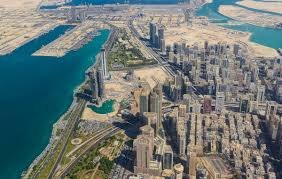Water is a precious resource, especially in arid regions like the UAE. With its rapid urbanization and growing population, Abu Dhabi has faced increasing water demand. However, the emirate has adopted innovative solutions to tackle water scarcity, focusing on desalination projects and smart water management systems. These groundbreaking efforts are setting a global example for sustainable water use.
The Importance of Water Conservation

Abu Dhabi, located in one of the world’s driest regions, receives minimal rainfall. Natural groundwater supplies are limited and depleting, making it essential to find alternative water sources. Desalination and smart water management are now at the forefront of the UAE’s efforts to secure a reliable and sustainable water supply.
Desalination: Transforming Seawater into Freshwater
Desalination is the process of removing salt and impurities from seawater to produce clean drinking water. Abu Dhabi is home to some of the largest and most advanced desalination plants in the world. The Taweelah Reverse Osmosis Plant is a prime example. This state-of-the-art facility produces over 200 million gallons of water daily, making it one of the largest reverse osmosis plants globally.


Unlike traditional thermal desalination, which uses a significant amount of energy, reverse osmosis consumes less power and reduces carbon emissions. Additionally, Abu Dhabi has introduced hybrid desalination plants that combine multiple technologies for greater efficiency.
Environmental Considerations
While desalination is a reliable solution, it also has environmental impacts. Brine discharge, a byproduct of the process, can harm marine ecosystems. To address this, Abu Dhabi has implemented sustainable practices such as advanced brine management systems and research into eco-friendly alternatives.

Smart Water Management: Enhancing Efficiency and Reducing Waste
In addition to desalination, Abu Dhabi is embracing smart water management systems. These technologies monitor water use in real time, detect leaks, and optimize distribution networks. Abu Dhabi’s Smart Water Network integrates sensors, data analytics, and AI-powered solutions to manage water more effectively.
Leak Detection and Prevention
Leaks in water networks often lead to significant water loss. Through the use of smart sensors and real-time monitoring, Abu Dhabi’s water management systems detect leaks quickly, reducing water waste and lowering repair costs.
Sustainable Irrigation
Agriculture is a major consumer of water. To address this, Abu Dhabi has introduced smart irrigation systems that use weather data and soil moisture sensors to ensure crops receive the right amount of water. This not only conserves water but also improves crop yield.
Water Recycling and Reuse
Recycled water is another key component of Abu Dhabi’s water management strategy. Treated wastewater is used for irrigation, landscaping, and industrial applications. This reduces the reliance on freshwater sources and promotes a circular water economy.
Government Initiatives and Policies
The Abu Dhabi government has launched several initiatives to promote water conservation. The Water Security Strategy 2036 outlines a comprehensive plan to ensure sustainable water supply through desalination, groundwater management, and water reuse. Additionally, public awareness campaigns encourage residents to reduce water consumption and adopt water-saving practices.
The Environment Agency – Abu Dhabi (EAD) also monitors and regulates water usage across sectors. Their efforts include promoting sustainable agricultural practices, reducing industrial water consumption, and protecting natural water resources.
Collaborative Efforts and Global Impact
Abu Dhabi’s water conservation initiatives have gained international recognition. The emirate collaborates with global organizations, research institutions, and private sector companies to exchange knowledge and implement innovative solutions. Projects like the Masdar Institute’s Renewable Energy Desalination Pilot Plant showcase how clean energy can power water desalination, reducing carbon footprints.
Furthermore, Abu Dhabi hosts annual sustainability events like the World Future Energy Summit (WFES), where leaders and innovators gather to discuss the future of water management and sustainable development.
Looking Ahead
Abu Dhabi’s commitment to water conservation through desalination and smart management reflects its dedication to sustainability. As the emirate continues to grow, these innovative solutions will ensure long-term water security. With ongoing investments in research and technology, Abu Dhabi is paving the way for a water-resilient future.
Through a combination of cutting-edge desalination plants, smart water networks, and responsible water use, Abu Dhabi is not only addressing its own water challenges but also serving as a global leader in sustainable water management.
Also read: Wildlife Conservation in Abu Dhabi: Protecting Species














